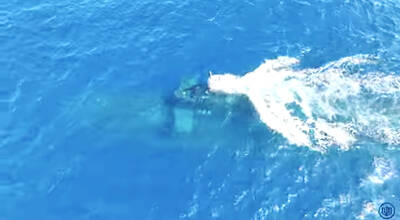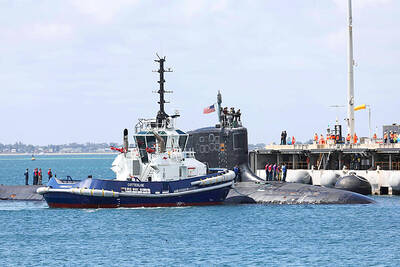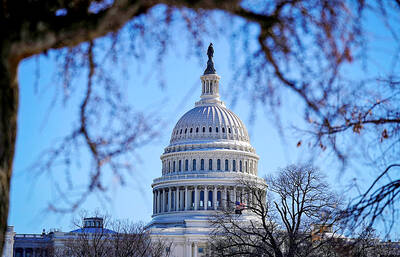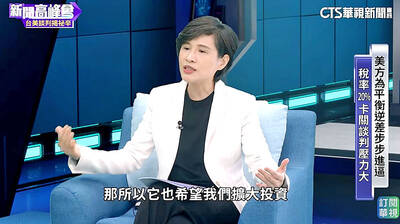Prosecutors yesterday issued another wave of indictments against former president Chen Shui-bian (陳水扁), charging him and four others with embezzlement in a case involving classified diplomatic projects.
The Supreme Prosecutors' Office's Special Investigation Panel (SIP), in charge of probing the former president's corruption and money laundering cases, said it had completed its investigations.
Prosecutors allege that public funds earmarked for diplomatic relations were embezzled by Chen, former National Security Council secretary-general Chiou I-jen (邱義仁) and former deputy foreign minister Michael Kau (高英茂), as well as two others whose bank accounts were used in the process.
They allege that during Chen's term as president, he deliberately failed to return the remaining balance of government funds dedicated to improving foreign relations.
Chen, Chiou and Kau are accused of violatng the Punishment for Corruption Act (貪污治罪條例).
Chiou has been listed as a defendant since last October, when SIP prosecutors and investigators obtained a warrant to search his home and found documents that they believe proved his involvement in the alleged crimes.
Aside from this case, SIP prosecutors are investigating other crimes they suspect the former first family committed during Chen's term of office, including Chen's accepting bribes related to Yuanta Financial Holding's (元大金控) merger with Fuhwa Financial Holding Co (復華金控).
He is also suspected of accepting bribes from former Chinatrust Financial Holding Co (中信金控) vice chairman Jeffrey Koo Jr (辜仲諒) in connection with Chinatrust's failed takeover bid of Mega Financial Holding Co (兆豐金控).
Prosecutors said they were probing more counts of money laundering, as well as friends of the former first family who are suspected of helping them hide cash and assets. These include the former president's family physician, Huang Fang-yen (黃芳彥), Yuanta Financial Holding Co president Victor Ma (馬維建) and Yuanta Financial Holding Co chief operating officer Michael Ma (馬維辰), all of whom are accused of helping Wu illegaly transfer funds overseas.
Huang has fled the country and is believed to be hiding in the US, where his family lives. He left for the US in November before prosecutors could question him about allegations that he helped Wu launder money.
SIP prosecutors yesterday also questioned former first lady Wu Shu-jen (吳淑珍) about the second phase of financial reform and businesspeople who allegedly gave money to the former first family to “receive protection” during the financial reform.
Wu resides in Kaohsiung with her son, Chen Chih-chung (陳致中).
Yesterday morning, the two paid a visit to Chen Shui-bian at the Taipei Detention Center, where he has been detained since Dec. 30.

CSBC Corp, Taiwan (台灣國際造船) yesterday released the first video documenting the submerged sea trials of Taiwan’s indigenous defense submarine prototype, the Hai Kun (海鯤), or Narwhal, showing underwater navigation and the launch of countermeasures. The footage shows the vessel’s first dive, steering and control system tests, and the raising and lowering of the periscope and antenna masts. It offered a rare look at the progress in the submarine’s sea acceptance tests. The Hai Kun carried out its first shallow-water diving trial late last month and has since completed four submerged tests, CSBC said. The newly released video compiles images recorded from Jan. 29 to

DETERRENCE EFFORTS: Washington and partners hope demonstrations of force would convince Beijing that military action against Taiwan would carry high costs The US is considering using HMAS Stirling in Western Australia as a forward base to strengthen its naval posture in a potential conflict with China, particularly over Taiwan, the Wall Street Journal reported on Saturday. As part of its Indo-Pacific strategy, Washington plans to deploy up to four nuclear-powered submarines at Stirling starting in 2027, providing a base near potential hot spots such as Taiwan and the South China Sea. The move also aims to enhance military integration with Pacific allies under the Australia-UK-US trilateral security partnership, the report said. Currently, US submarines operate from Guam, but the island could

RESTRAINTS: Should China’s actions pose any threat to Taiwan’s security, economic or social systems, China would be excluded from major financial institutions, the bill says The US House of Representatives on Monday passed the PROTECT Taiwan Act, which states that Washington would exclude China from participating in major global financial organizations if its actions directly threaten Taiwan’s security. The bill, proposed by Republican Representative Frank Lucas, passed with 395 votes in favor and two against. It stipulates that if China’s actions pose any threat to Taiwan’s security, economic or social systems, the US would, “to the maximum extent practicable,” exclude Beijing from international financial institutions, including the G20, the Bank for International Settlements and the Financial Stability Board. The bill makes it clear that China must be prepared

Taiwanese trade negotiators told Washington that Taipei would not relocate 40 percent of its semiconductor production to the US, and that its most advanced technologies would remain in the nation, Vice Premier Cheng Li-chiun (鄭麗君) said on Sunday. “I told the US side very clearly — that’s impossible,” Cheng, who led the negotiation team, said in an interview that aired on Sunday night on Chinese Television System. Cheng was referring to remarks last month by US Secretary of Commerce Howard Lutnick, in which he said his goal was to bring 40 percent of Taiwan’s chip supply chain to the US Taiwan’s almost